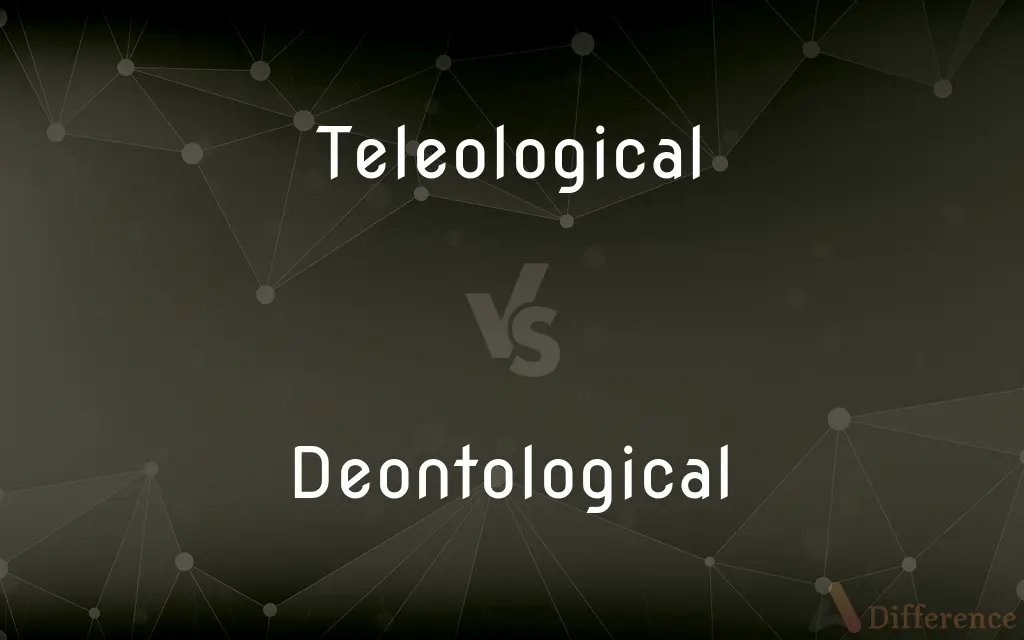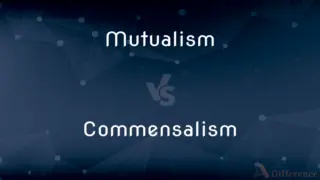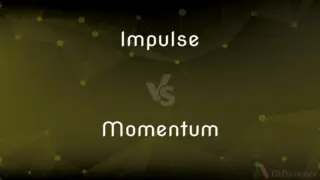Teleological vs. Deontological — What's the Difference?
By Maham Liaqat & Fiza Rafique — Updated on April 15, 2024
Teleological ethics judge the morality of actions based on the outcomes or goals achieved, whereas deontological ethics focus on the inherent rightness or wrongness of actions, regardless of their consequences.

Difference Between Teleological and Deontological
Table of Contents
ADVERTISEMENT
Key Differences
Teleological ethics, also known as consequentialism, argues that the moral worth of an action is determined by its outcome. On the other hand, deontological ethics, based on the philosophy of Immanuel Kant among others, suggests that actions are morally right if they align with certain duties and rules, irrespective of the outcomes.
In teleological ethics, the ends justify the means—if the outcome brings about a greater good or beneficial results, the action is considered ethical. Whereas, in deontological ethics, the correctness of an action is paramount, and it must be done out of duty to moral law, even if it results in a less desirable outcome.
Teleological theories often focus on maximizing happiness or good outcomes for the greatest number of people, a concept central to utilitarianism, a prominent teleological view. On the other hand, deontological theories stress adherence to principles such as honesty, promise-keeping, and justice, regardless of the consequences.
The flexibility of teleological ethics allows for pragmatic decisions based on varying situations, making it adaptable but also sometimes unpredictable. Whereas, the rigid structure of deontological ethics provides consistency and predictability in moral judgments but can lead to dilemmas when moral laws conflict.
A teleological approach might sanction a morally dubious act if it leads to a beneficial result, such as lying to save a life. In contrast, a deontological approach would typically argue against lying, regardless of the positive implications, emphasizing adherence to truthfulness as a moral duty.
ADVERTISEMENT
Comparison Chart
Core Principle
The ends justify the means
Duty and rule compliance are paramount
Focus
Outcomes of actions
Rightness of actions
Philosophical Basis
Utilitarianism, consequentialism
Kantian ethics, rule-based ethics
Decision Criteria
Outcomes that maximize happiness or good
Adherence to moral rules and duties
Moral Flexibility
High, actions vary by situation
Low, actions guided by fixed moral laws
Compare with Definitions
Teleological
Ethics determined by the consequences of actions.
A policy is deemed good if it results in economic prosperity for the majority.
Deontological
Upholds moral principles even if outcomes are negative.
Upholding free speech rights even when disagreeable opinions are expressed.
Teleological
A principle where the goal is to maximize overall happiness.
Vaccination policies are justified by the health benefits they provide to the population.
Deontological
Ethics determined by adherence to set duties.
A whistleblower reveals corruption because it’s their moral duty, despite potential personal consequences.
Teleological
Adapts to circumstances to achieve the best outcome.
Changing a business strategy to address unforeseen economic downturns.
Deontological
Strict following of moral rules.
A judge must apply the law impartially, regardless of personal feelings.
Teleological
Can lead to ethical dilemmas when outcomes are unpredictable.
Supporting a war that might bring peace but at the cost of lives.
Deontological
Actions are right if they conform to universal moral laws.
Telling the truth is necessary, even if it leads to harm.
Teleological
Actions are right if they benefit the most people.
Implementing taxes on the wealthy to fund social welfare programs.
Deontological
Consistent application of moral principles.
Refusing to break confidentiality under any circumstances.
Teleological
The philosophical interpretation of natural phenomena as exhibiting purpose or design.
Deontological
Ethical or moral theory concerned with duties and rights.
Teleological
The use of ultimate purpose or design as a means of explaining phenomena.
Deontological
The doctrine that ethical status of an action lies in its adherence to a set of rules.
Teleological
Belief in or the perception of purposeful development toward an end, as in history.
Deontological
Of or relating to deontology.
Teleological
Of or pertaining to teleology; showing evidence of design or purpose.
Deontological
Pertaining to deontology.
Teleological
Of or pertaining to teleology, or the doctrine of design.
Teleological
Showing evidence of design or purpose, especially in natural phenomena.
Teleological
Of or relating to teleology
Common Curiosities
What is the main philosophical difference between teleological and deontological ethics?
Teleological ethics focus on the consequences of actions to determine morality, while deontological ethics rely on the inherent morality of actions based on duty and rules.
What is a typical deontological ethical stance on lying?
Lying is inherently wrong, regardless of the consequences, because it violates the moral law of truthfulness.
How do teleological ethics view individual rights vs. collective good?
Teleological ethics often prioritize the collective good if it results in the best overall outcome, even at the expense of individual rights.
What kind of ethical dilemmas might arise from deontological ethics?
Dilemmas arise when two or more moral duties conflict, such as the duty to protect privacy versus the duty to prevent harm.
Can you provide an example of a teleological ethical decision?
Choosing to implement strict public health measures during a pandemic to save lives, despite significant temporary discomfort to individuals.
What are the criticisms of deontological ethics?
Criticisms include rigidity in moral judgments that may lead to harsh outcomes and the challenge of applying universal rules to complex, varying situations.
How do teleological ethics handle conflicting outcomes?
Teleological ethics would weigh the potential outcomes and choose the action that maximizes the overall good or minimizes harm.
What are the criticisms of teleological ethics?
Criticisms include the potential justification of unethical means by desirable ends and the difficulty in accurately predicting outcomes.
Is there a hybrid approach that combines elements of both ethical theories?
Yes, some ethical frameworks, like rule-utilitarianism, combine deontological adherence to rules with a teleological focus on outcomes to guide decision-making.
Can deontological principles be too restrictive in practical scenarios?
Yes, adhering strictly to deontological principles can sometimes be impractical or lead to undesirable consequences in complex real-world situations.
How do teleological and deontological ethics apply to environmental ethics?
Teleological ethics would support actions that lead to the best overall environmental outcomes, while deontological ethics would argue for the intrinsic duty to protect the environment, regardless of specific outcomes.
Why might a deontologist oppose utilitarian policies?
A deontologist might oppose utilitarian policies if they compromise individual rights or moral duties for the sake of a greater good.
Which approach might be more applicable in business ethics?
This depends on the situation; teleological ethics might be more suited for decisions requiring flexibility and outcome consideration, while deontological ethics might be preferred for upholding corporate integrity and rule compliance.
How does each ethical theory view the importance of intention in actions?
Deontological ethics place significant importance on the intention behind actions, valuing actions done from duty over those done from self-interest or for outcomes. Teleological ethics, however, primarily consider the result of the actions rather than intentions.
How do teleological ethics respond to unforeseen negative outcomes?
Teleological ethics would reassess and possibly regret an action if the actual outcomes are significantly negative compared to the predicted beneficial outcomes.
Share Your Discovery

Previous Comparison
Mutualism vs. Commensalism
Next Comparison
Impulse vs. MomentumAuthor Spotlight
Written by
Maham LiaqatCo-written by
Fiza RafiqueFiza Rafique is a skilled content writer at AskDifference.com, where she meticulously refines and enhances written pieces. Drawing from her vast editorial expertise, Fiza ensures clarity, accuracy, and precision in every article. Passionate about language, she continually seeks to elevate the quality of content for readers worldwide.
















































